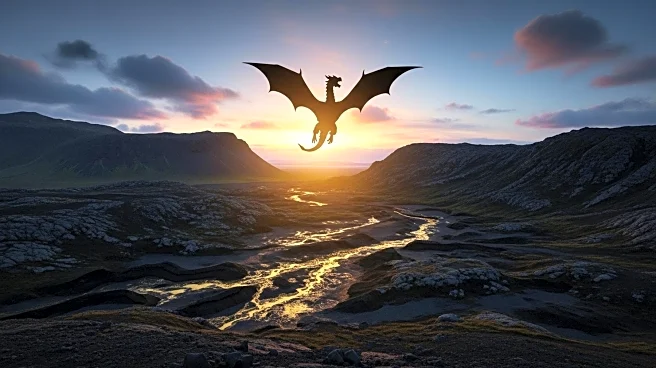What is the story about?
What's Happening?
Geoscientists from the University of Iceland and ÍSOR have concluded that oil exploration in Iceland's Dreki area, also known as the Dragon area, is unlikely to be economically viable. Anett Blischke, a seabed geophysicist at ÍSOR, and Bryndís Brandsdóttir, a geophysicist at the University of Iceland's Institute of Earth Sciences, have highlighted the technical complexities and high costs associated with drilling in the region due to its thick basalt cover and fractured geology. Their analysis, published on the University of Iceland Science Web, indicates a lack of hard evidence for oil or gas, with no observed seeps on the seabed and insufficient seismic reflection data to suggest commercially viable deposits. This assessment challenges the Icelandic Chamber of Commerce's recent call for government incentives to promote oil development in the area.
Why It's Important?
The findings by Icelandic scientists have significant implications for the country's energy strategy and economic prospects. The Dragon area's potential for oil exploration has been a topic of interest since the 1960s, with hopes of tapping into North Atlantic resources. However, the current analysis suggests that pursuing oil development in this region may not be financially justified, potentially redirecting focus and resources to more promising areas. This could impact Iceland's energy policy and its approach to natural resource management, as well as influence the decisions of international oil companies considering investments in the region. The economic viability of such projects is crucial for stakeholders, including the Icelandic government and the energy industry, as they weigh the benefits against the risks and costs involved.
What's Next?
Given the scientists' conclusions, it is likely that oil companies will continue to be hesitant about investing in the Dragon area. The Icelandic government may need to reassess its strategy and consider alternative energy sources or exploration sites that offer better economic prospects. The call from the Icelandic Chamber of Commerce for new incentives may prompt further discussions on how to balance economic development with environmental and financial considerations. Stakeholders, including policymakers and industry leaders, will need to evaluate the long-term implications of these findings and potentially shift focus to other areas within the North Atlantic that present more favorable conditions for oil exploration.















